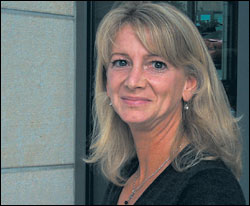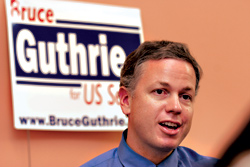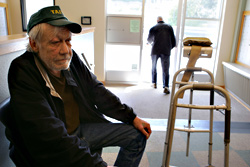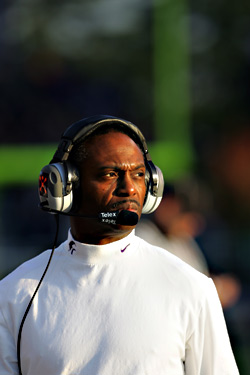On the surface, Sam Pailca, the director of the Seattle Police Department’s Office of Professional Accountability (OPA), appears to be a law-enforcement insider. She’s the civilian who oversees the internal investigations unit and reviews the hundreds of complaints leveled against police officers each year. She works in the police headquarters building at Fifth Avenue and Cherry Street, is on the SPD payroll, and a conference room is all that separates her office from that of Police Chief Gil Kerlikowske.
After the Seattle City Council spent much political capital in the late-1990s to carve oversight into the municipal code, Pailca’s inside-the-halls perspective is what police accountability looks like in Seattle. From this, many in the city conclude that the 39-year-old lawyer is little more than a police stooge, and OPA is a “toothless dog with no bark,” as Sheley Secrest, chair of the police complaints committee of the NAACP’s Seattle chapter, puts it.
Pailca, who began a three-year term of office in 2001, concedes she has a public-perception problem: “When I go out into the community and tell people about civilian oversight and mention that ‘Oh, yes, I also work for the chief,’ I lose half my audience.”
But as far as street cops are concerned, Pailca is far from being a patsy. “The reaction among officers when Sam started was, ‘Here we go,’ and it’s been a knife fight ever since,” says Ken Saucier, president of the Seattle Police Officers Guild.
Last year, as a result of OPA’s work, three officers were fired, and in 11 investigations in which Pailca found officers at fault, including some use-of-force cases, Kerlikowske overturned her findings. With such professional tension between the chief and Pailca, why do so many citizens say OPA is broken, and why does the police union, as Saucier says, feel the system is skewed against them?
Like anything else involving citizen-cop conflicts, the answers are deeply complicated and political. It’s a dispute over what will satisfy the public’s demand for transparent review of alleged police misconduct, fit the police union’s demands for fairness, and let City Council members, who lately have displayed a penchant for cutting the public out of police-accountability discussions, walk away with their political hides intact.
SEATTLE’S VERSION of police accountability was born two weeks before the World Trade Organization protests in November 1999. That was when then-council member Tina Podlodowski introduced legislation creating OPA, an attempt, she says now, to replace an internal investigations auditor position with independent review of the police and to counteract the “out-of-touch” institutional blindness of then-Chief Norm Stamper and then-Mayor Paul Schell.
OPA was crafted as a three-legged stool with an OPA director (a citizen who would effectively run SPD’s internal investigations function), an OPA auditor (to review the director’s work), and an OPA review board (three citizens to review a portion of OPA’s investigations for soundness). But at the time, the city was negotiating a new contract with the Police Guild. The mayor’s office, City Council, and the guild all believed that OPA was subject to bargaining in the contract because it could affect salaries, working conditions, and discipline. According to Podlodowski and the American Civil Liberties Union of Washington, the city bargained away several provisions of OPA behind closed doors in 2000 and 2001. In one case, the city gave the guild effective control over who sits on the OPA review board.
While the moves didn’t end police accountability in Seattle by any means, critics say granting the guild that power diluted the purity of the process and stripped away the essential component of public trust. “This is not what was originally envisioned,” says Podlodowski, who would prefer to see Pailca out of police headquarters and off of the cop payroll.
Sam Walker, a professor of criminal justice at the University of Nebraska-Omaha and a national expert on police accountability systems, says he doesn’t know of another city where a police union has been able to negotiate already legislated accountability regulations. He adds that federal labor laws do not make police accountability subject to collective bargaining. “That’s unique,” he says. “But the city has been caving to the union for years.”
IT’S NOT CLEAR whether the city is still giving in to union demands during current contract talks with the guild to replace the contract that expired last December. The negotiations are held behind closed doors and neither side will make public its bargaining positions. That has alarmed the Minority Executive Directors Coalition, a group representing the city’s many ethnic minority advocacy groups. On Sept. 22, they came before the council to calmly demand public hearings on possible changes to OPA. Some in the group advocate full-blown citizen review of the police, as opposed to the more insider-seeming OPA system.
To date, the council has been largely unresponsive to the demand. City Council member Jan Drago, citing a perceived fear of legal action from the union, recently argued that the council’s Labor Relations Policy Committee, a secretive body overseeing the city’s contract bargaining, which she chairs, had to hold a closed-door meeting in order to decide if the council could even hold a public hearing. Pressed by Seattle Weekly through its lawyers on the potential illegality of closing such a meeting, the city canceled it.
SO WHAT’S SO BAD about the OPA? Members of the minority coalition will tell you that by dint of being inside police HQ, Pailca is biased toward cops and that police shootings of African-American men such as David Walker and Aaron Roberts, and the later exoneration of cops in the controversial shootings, are proof that the system is broken. But the OPA currently has no review power over police shootings.
For its part, the police union simply doesn’t care for Pailca. “It was the way she came in,” says Saucier, who described her attitude as “I don’t want to know you or what you doI’m here to root out evil.” Saucier says cops aren’t getting fair treatment at the hands of OPA. For example, he characterizes the firing of two officers last year after an OPA investigation into alleged cheating on a sergeant’s examination as unfair and says that the union has filed a complaint with the state’s Public Employee Relations Commission.
Pailca herself doesn’t brush aside such concerns, although she admits that she and the union have had a bumpy relationship from the get-go. What’s more, Pailca argues for some changes to be made to OPA, although she’s diplomatic about how she makes her case. She says she would like to see “an expanded role” for OPA in reviews of police shootings. Currently, the office only plays a part in such a review if it is referred to OPA by Kerlikowske or SPD’s firearms review committee. Pailca also favors a place for OPA in advancing a public discussion of how police handle political demonstrations. Pailca also wants her office to take a broader role in shaping police policy and officer training, all of which affect the what and the how of street policing and what ultimately lands in the OPA’s in-box. She says she made her wishes known to the city’s labor negotiating team, but she won’t say if those items are on the table.
Pailca is less enamored of moving her office out of police HQ, although she says she understands it might mollify critics. But she worries that being outside the day-to-day life of the department would reduce her to being someone sending memos to department leaders from across the street, instead of someone with an outsider’s perspective on policing with whom officials have to deal each day. “I know at the end of the day that it makes a difference,” she says, calling what she brings to the process “a fresh perspective.”
It’s less clear what the City Council thinks. The council member most enmeshed in police accountability is Jim Compton, who chairs the Police, Fire, Courts, and Technology Committee. In recent months, Compton has indicated interest in seeing more rigorous police accountability. He did not return calls seeking comment for this article. Council member Nick Licata calls the current OPA a “good first step” but would like to fix the symbolic disparity of having Pailca inside the department while sitting in judgment of its work. He also would like the few cases the OPA review board examines to include the names of officers.
THE UNION ITSELF, although dead-set against releasing officer names to the review board, accepts police accountability as a reality. “We’re not against accountability,” says Saucier. “We just want a system that’s fair and standardized.”
Pailca, who’s expected to be appointed to a new three-year term later this year, says she doesn’t buy that. “If the guild can make an argument that’s thoughtful and based on sound public policy, I’ll make every effort to get there with the union,” she says, noting that in the current environment of mistrust “it may require that you have to go on without them.”








